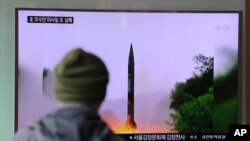U.S. and South Korean military officials say they have detected a failed ballistic missile launch in North Korea near the northwestern city of Kusong.
In a statement, The North American Aerospace Defense Command (NORAD) said North Korea likely launched a Musudan intermediate-range missile early Thursday. U.S. and South Korean monitors say the missile appeared to have exploded shortly after take-off and thus posed no threat.
"We strongly condemn the North's continued illegal acts of provocation and are fully prepared to counter any further provocations," the South Korean Joint Chiefs of Staff said in a statement Thursday.
Japanese Chief Cabinet Secretary Yoshihide Suga said at a news conference Thursday Japan was aware of the missile launch and expects more missiles out of North Korea as the country expands its development program.
"The [Japanese] government, through diplomatic routes via the Embassy in Beijing, has officially protested this and condemns this launch," he said.
This was the second launch in less than a week of a Musudan missile with a range that could easily reach Japan or South Korea and is also believed to be capable of reaching the U.S. territory of Guam. The previous launch, Saturday, also ended in failure, with the missile exploding shortly after take-off.
There have been eight Musudan missiles fired off this year by North Korea. Of the eight, a missile launched on June 22 flew 400 km into the Sea of Japan and reached an altitude of more than 1,400 km. Others exploded shortly after being launched, an indication the North has not yet fully mastered the technology.
Thursday's launch comes as U.S. and South Korean officials meet in Washington for their annual security and alliance talks, which are expected to include discussions on measures to counter nuclear and missile threats from Pyongyang. The U.S. is considering the permanent deployment at its bases in South Korea of B-1B and nuclear capable B-52 bombers, F-22 stealth fighter jets and nuclear-powered submarines, according to defense and diplomatic sources.
The missile test also comes as the United States and China are trying to find agreement on a new United Nations sanctions resolution after the North's September nuclear test.
The U.N. Security Council condemned Saturday's failed missile launch and threatened additional measures to deter North Korea’s missile ambitions.
In a statement released Monday, the council said it held an emergency closed-door meeting to discuss the failed launch. It said Saturday's launch was in “great violation” of several past resolutions and North Korea must refrain from further testing of ballistic missiles and nuclear devices.
Pentagon Correspondent Carla Babb contributed to this report.





